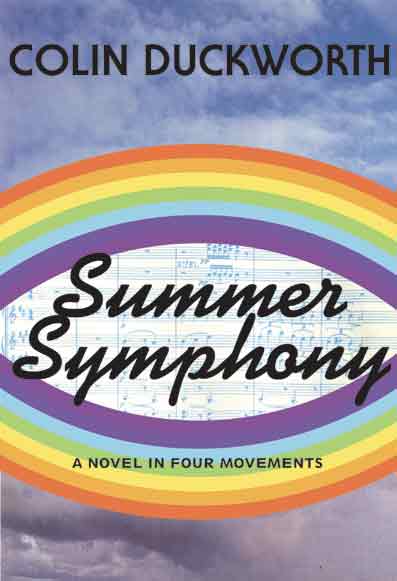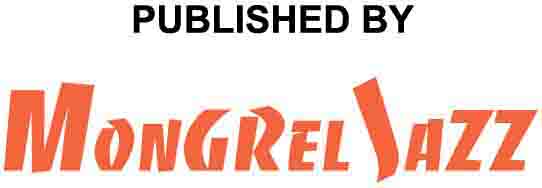 Summer
Symphony:
Summer
Symphony:A Novel in Four Movements Colin Duckworth Summer Symphony is an ambitious work, a rich read. I would have liked to read the story to its natural conclusion - it is a shame that this book is a ‘novel in four movements’ instead of an epic in four books. William Brown, Wet Ink  |
| Down to Book Description Contents Book Sample |
Down
to Book Reviews Wet Ink |
Duckworth biography | Next title Previous title Home page All publications |
||
Mongrel Jazz, an imprint
of Black Pepper, launched Summer
Symphony: A Novel
In Four Movements, by Colin Duckworth on 8 August 2005 at
The
Stork Hotel, Melbourne, with a speech from Dr
David
Kram, Associate of the Royal College of Music, composer, librettist,
conductor and Head of Opera, Victorian College
of the Arts.
Colin Duckworth’s third novel tells of the power of love to encourage and inspire, and music’s power to move and heal. But music can also be immensely destructive. A battle between good and evil is fought, with music as the weapon.
Colin Duckworth’s third novel tells of the power of love to encourage and inspire, and music’s power to move and heal. But music can also be immensely destructive. A battle between good and evil is fought, with music as the weapon.
Book Description
1971. In
London’s Festival Hall Alan Scott’s Symphony of Universal Healing
is first performed. Its mystic harmonics have extraordinary effects on
the audience: an elderly woman stands up, exclaiming she has not been
able to do that for years. Another, younger, woman, admits without
embarrassment that the performance gave her an orgasm. In this
predominantly English middle-class audience the unthinkable has
happened. People start to talk openly about an unusual feeling of
wellbeing. After the concert a stranger introduces himself to Alan and
his wife as an old school friend, Keith Maxtel. From that point on, the
disquieting past intrudes.The chequered love story of Alan and his wife
Bella begins when they are fifteen and Hitler’s bombs are
raining
down onEngland. Their musical quest (mystical to Alan, scientific to
neuropsychologist Bella) is sparked by their experience of an
inexplicable healing phenomenon in a Norman château duringthe
Liberation. It extends to the past and the future, from Paris in the
1890s to California in the early 21st century. Alan is determined to
find out why he, a musically gifted but nondescript boy from a suburban
background, became guardian of such powerful mystical harmonies.
Harmonies which others might seek for their dark and destructive
aspects. Alan and Bella’s decisions will prove crucial.
ISBN 1876044993
Published 2005
334 pgs
Summer Symphony book sample
Back to top
First Movement
TEMPO 2: ALLEMANDE: barbaro - tragico - amoroso - marziale
Second Movement
TEMPO 2: ALLEGRO: volando - mistico - spirituoso
Third Movement
TEMPO 2: ANDANTE: lagrimoso - FUGUE: con dolore
Fourth Movement
TEMPO 2: FINALE: scherzo vivace
Back to top
The Latest Word
Summer Symphon
William Brown
Wet Ink, Issue 3, Winter 2006
Summer Symphony chronicles the lives of Alan Scott, composer, and Bella Cassell, neuropsychologist and their efforts to transcribe and understand the seven harmonies (which exist only in Alan’s mind). The seven harmonies are an immensely powerful combination of musical frequencies that have great effect on the human mind and body for good or possibly ill. Told mostly from the perspective of Alan, this fascinating tale takes the reader from wartime Birmingham and London, England, through post-war France and up to present-day California, with focus on 1970’s London.
Though the section headings, comprised of music terminology and quotations, may seem daunting at first, it is not necessary to be familiar with either to appreciate this tale. It is not necessary, either, to be able to read French, which appears frequently in the early sections of the story. Summer Symphony is written so that anyone, regardless of linguistic or musical experience, can enjoy and understand it.
Though I admire the creativity, structuring and loads of research that were utilised in constructing this book, the narrative voice detracted from the experience for me. Though this voice is disembodied, it is at times too strong - especially when jumping across character perspectives, revealing the thought processes of those characters, and foreshadowing events to come. If the characters are allowed to show the tale through their own actions and dialogue, the illusion is stronger, and the story more gripping and real.
The real strength of this story comes out in the early sections of Alan’s life - when he meets Bella, comes to grips with the music in his head, and experiences all those firsts we all went through growing up. Alan, and thus the story, experiences more conflict not just because of the Battle of Britain, but because he is growing up, discovering his family history, finding his path and leaving home. Not to say that a strong story is solely based on conflict and firsts, but in these early sections the narrator allows the story to express itself more, and is stronger for it.
Summer Symphony is an ambitious work, a rich read. I would have liked to read the story to its natural conclusion - it is a shame that this book is a ‘novel in four movements’ instead of an epic in four books.
Back to top
Duckworth’s pace and
timing are just about perfect.
The Weekend Australian
The Weekend Australian
ISBN 1876044993
Published 2005
334 pgs
Summer Symphony book sample
Back to top
First Movement
‘I
sigh the lack of many a thing I sought.’
WHITE: C major > RED: G minor
TEMPO 1: Duo - TrioWHITE: C major > RED: G minor
TEMPO 2: ALLEMANDE: barbaro - tragico - amoroso - marziale
Second Movement
Mysteries
PURPLE: B flat major
TEMPO 1: misteriosoPURPLE: B flat major
TEMPO 2: ALLEGRO: volando - mistico - spirituoso
Third Movement
Revelations
GREEN: F minor
TEMPO 1: alto ma piů profondoGREEN: F minor
TEMPO 2: ANDANTE: lagrimoso - FUGUE: con dolore
Fourth Movement
Resolutions
BLUE: E major
TEMPO 1: precipitoso, minaccevoleBLUE: E major
TEMPO 2: FINALE: scherzo vivace
Back to top
Reviews
The Latest Word
Summer Symphon
William Brown
Wet Ink, Issue 3, Winter 2006
Summer Symphony chronicles the lives of Alan Scott, composer, and Bella Cassell, neuropsychologist and their efforts to transcribe and understand the seven harmonies (which exist only in Alan’s mind). The seven harmonies are an immensely powerful combination of musical frequencies that have great effect on the human mind and body for good or possibly ill. Told mostly from the perspective of Alan, this fascinating tale takes the reader from wartime Birmingham and London, England, through post-war France and up to present-day California, with focus on 1970’s London.
Though the section headings, comprised of music terminology and quotations, may seem daunting at first, it is not necessary to be familiar with either to appreciate this tale. It is not necessary, either, to be able to read French, which appears frequently in the early sections of the story. Summer Symphony is written so that anyone, regardless of linguistic or musical experience, can enjoy and understand it.
Though I admire the creativity, structuring and loads of research that were utilised in constructing this book, the narrative voice detracted from the experience for me. Though this voice is disembodied, it is at times too strong - especially when jumping across character perspectives, revealing the thought processes of those characters, and foreshadowing events to come. If the characters are allowed to show the tale through their own actions and dialogue, the illusion is stronger, and the story more gripping and real.
The real strength of this story comes out in the early sections of Alan’s life - when he meets Bella, comes to grips with the music in his head, and experiences all those firsts we all went through growing up. Alan, and thus the story, experiences more conflict not just because of the Battle of Britain, but because he is growing up, discovering his family history, finding his path and leaving home. Not to say that a strong story is solely based on conflict and firsts, but in these early sections the narrator allows the story to express itself more, and is stronger for it.
Summer Symphony is an ambitious work, a rich read. I would have liked to read the story to its natural conclusion - it is a shame that this book is a ‘novel in four movements’ instead of an epic in four books.
Back to top